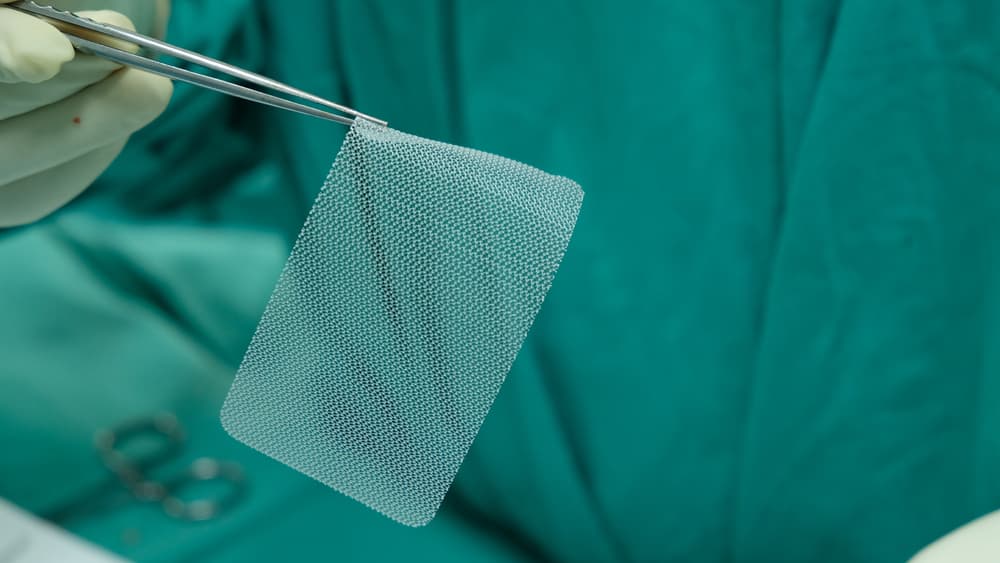Millions of people undergo hernia repair surgeries every year. However, these common procedures carry risks. Many complications and injuries arise from hernia repair operations, and one of the major culprits of postoperative problems is hernia mesh implants.
A leading manufacturer of hernia mesh implants worldwide is C.R. Bard, and their implants have a history of eroding inside the body, leading to severe side effects and chronic pain.
Numerous lawsuits have arisen against Bard for their defective products, so much so that the court system has consolidated them into a multi-district litigation (MDL) to expedite the recovery of damages to victims.
If you or a loved one received a Bard hernia mesh implant and have experienced severe complications and problems because of it, you could obtain compensation for your injuries. Contact an experienced Bard mesh implant injury attorney today for a free review of your case and advice regarding your options for joining the class action and getting compensation for your pain and suffering.
Why and Where Do Hernias Happen?
A hernia occurs when the intestines or another internal organ pushes through the muscle and other soft tissue surrounding it.
Some people naturally have weakened areas in their bodies that make them more susceptible to hernias than others, but virtually anyone can get a hernia by:
- Overexerting themselves
- Attempting to lift heavy objects
- Doing other strenuous activities.
In some cases, people can get hernias from persistent coughing or sneezing, or from straining during a bowel movement. Hernias can also result after surgeries at the site of the operation because the muscles and tissues are weaker in those areas. Hernias most commonly occur in the abdomen, groin, and around the navel.
What Is a Hernia Mesh?
A hernia mesh is a medical device surgeons use to support the damaged tissue surrounding a hernia as it heals. Surgeons typically attach the mesh using special glue, staples, or sutures. According to the U.S. Food and Drug Administration (FDA), mesh implants are used in approximately 90 percent or more of all hernia operations in the United States.
Overall, the FDA considers hernia meshes safe and effective and claims that they help patients recover quicker with better results. However, the FDA also recognizes the link between hernia meshes and complications, and the agency lists manufacturer recalls of the devices.
Hernia meshes come in various sizes and different materials, most commonly a synthetic polypropylene (#5 plastic). The devices usually consist of woven fibers that form the mesh. Absorbable mesh implants degrade and lose strength over time while new natural tissue grows and fills in the area for support. Non-absorbable mesh implants remain in the body indefinitely to provide long-lasting reinforcement.
Over a ten-year period, 6,387 patients underwent surgery to repair a hernia with a mesh implant. Within five years, more than 4% of those patients reported “severe or disabling symptoms” associated with mesh implant complications.
What Problems Do Bard Mesh Implants Cause?
Bard hernia mesh implants have come under fire recently because of the side effects, injuries, and other issues they cause.
Some issues that have resulted from the implants include:
- Erosion and shrinkage. Bard’s hernia meshes tend to erode and shrink after surgeons implant them. Their polypropylene material deteriorates when it comes in contact with oxygen (oxidizes), including the oxygen present in blood and tissue. Since the mesh attaches to the abdominal wall, it can pull and tear at surrounding tissue, causing excruciating pain, bleeding, and perforations. In some cases, the shrinkage or erosion can lead to another hernia since the surrounding tissue loses support or suffers damage.
- Migration. If the hernia mesh tears completely away from the abdominal wall, it can roll up and travel to other areas of the body. Mesh migration can cause terrible medical issues as it affects or damages other organs and tissue.
- Adhesion. Hernia meshes can also cause problems when they adhere to other organs and tissue they aren’t supposed to. Although Bard’s hernia meshes have forward-facing and backward-facing plates to prevent adhesions, they do not always work because the materials may oxidize or erode at different rates. The issue can lead to fistulas, bowel obstructions, internal bleeding, muscle perforation, reduced mobility, and chronic pain.
- Seromas. Hernia mesh implants can also lead to seromas, which occur when fluid builds up under the skin. This can cause complications that require additional medical care.
- Infections. Infections are an ever-present risk with hernia mesh implants. The porous material can harbor bacteria, so doctors must properly sterilize it before surgery. Even if physicians properly sterilize the implant, any surgery holds a risk for infection, and an infection could set in a compromised mesh.
Additionally, some patients’ bodies reject the mesh because the material is foreign to their body, and a “localized inflammatory response” can occur at the site of the implant.
If My Bard Hernia Mesh Implant Failed, What Should I Do?
If your Bard hernia mesh implant failed, and you have experienced severe pain and other serious complications, address the matter immediately. Consult your primary care physician or the surgeon who performed the hernia mesh implant surgery. They can evaluate your symptoms, conduct a physical examination, and order any necessary tests to determine the cause of the failure.
You should also collect all relevant medical records, including details of the initial hernia mesh implant surgery, subsequent treatments, and any complications or symptoms you have experienced. Keep a record of your symptoms, complications, and the impact they have on your daily life. This information will help your healthcare provider assess your case accurately. You will also need to provide this information to an attorney if you decide to take legal action or seek compensation for your injuries.
If you worry about your initial diagnosis or treatment plan, or if you don’t feel you can trust the doctor who performed the surgery to provide an objective assessment, consult another healthcare professional who specializes in hernia repairs or hernia mesh complications. They can provide an independent evaluation and offer additional insights or alternative treatment options. A hernia mesh lawyer can probably direct you to such a doctor.
You may need additional surgeries to remove the hernia mesh and/or repair the damage it caused to other organs and tissue. You may also need considerable medical treatment to address a resulting infection or other complications.
The medical procedures you need to deal with your Bard mesh implant problems will create additional costs and suffering, and you shouldn’t have to face the ordeal alone. You have options for getting the compensation you need, but you will need an attorney to do that.
How Do I Qualify for Compensation?
To pursue compensation for your Bard hernia mesh implant injury, you need to meet certain qualifications, including:
- Your initial hernia surgery occurred in the mid-2000s or later.
- You have had a second surgery in the mesh implant area.
- You received a recommendation from your physician to undergo revision surgery.
Other factors may qualify you for compensation as well, and an attorney can review your case and determine if you do.
Consult an Attorney

If you suspect that your Bard hernia mesh implant failed due to a manufacturing defect, design flaw, or negligence, consult an attorney with experience in medical device litigation.
Many lawyers don’t take these cases and many others lack the experience or resources to take them on.
Look for a law firm with many years of experience dealing with Bard hernia mesh implant cases. An experienced lawyer can help you join the MDL class action involving Bard hernia mesh implants or advise you of other options to obtain compensation for your Bard hernia mesh implant injuries.
Contact a law firm near you today to request a free consultation with an experienced personal injury attorney.
